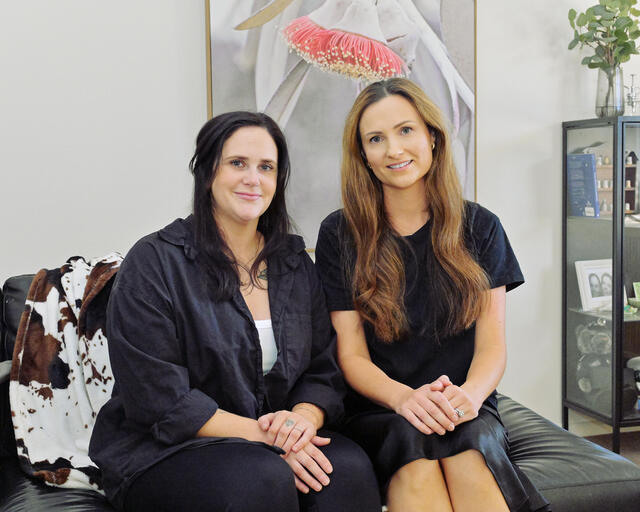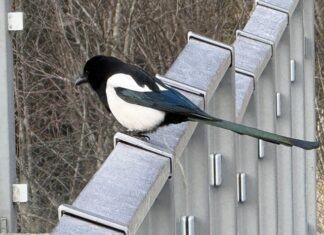The Geelong Independent looks back on our best Friday features for 2024.
Sue Seel was diagnosed with dementia two years ago at age 55. Her daughter Jess Mahon and daughter-in-law Sinead Stevenson spoke with Jena Carr about their mother’s journey ahead of the family’s participation in the Geelong Memory Walk and Jog on Sunday, April 28.
A Lara family went through a “life-altering” experience when a young grandmother was diagnosed with a devastating disease two years ago.
Jess Mahon said her mum, Sue Seel, used to always be on the move and doing a project or cleaning the house.
“The easiest way to explain it is mum was very organised…and she was on top of everyone. You’ve never met anything like it as she didn’t miss a beat,” she said.
“It just started with little things that were out of character. For a normal person, you may forget something here or there, but mum didn’t forget anything.
“She started to become quite anxious, especially when she would go to Ballarat to visit her friend. They’ve been best friends since they were in their 20s, and she’d start getting anxious on the drive.
“She would pull over, ring my dad and have panic attacks; that wasn’t mum. I think her 50th birthday, when she had quite a big panic attack, that was a big tell for us.”
Sue was diagnosed with frontotemporal dementia (the result of damage to neurons in the brain’s frontal and temporal lobes) and Alzheimer’s at age 55 in 2022.
Jess said her mum’s diagnosis threw the whole family’s “world upside down”.
“I think the worst part is seeing how frustrated she is, because she knows what she used capable of, to what she’s capable of now,” she said.
“She gets very embarrassed if she can’t keep the conversation going or remember what she’s meant to do, and you can see her kind of retreat a little bit.
“She explained it like a roadblock. She’ll be mid-conversation, and then there’s nothing…but she will never say too much to us at the risk of upsetting us; she doesn’t want to upset anyone around her.
“There’s only so much we can do without putting her through reminders all the time. We know how this is going to eventuate and we just want to keep her calm and relaxed.”
Despite some hard times over the years, Jess said her mum was herself the most when she was around her grandchildren as she had always wanted to be a grandmother.
“She’s so committed to enjoying every single moment with the grandkids that she doesn’t care if she’s running around in the backyard,” she said.
“She’ll do whatever they want her to do because she just wants to be with them. She adores them, and she’s always wanted to be a grandma.
“My son wanted grandma to play mini golf with him the other day, and he’s holding her hands and trying to show her how to do it. The grandkids will take her hand and guide her where they want her to go.
“The family are all on the same page where, this is happening to her, and while she can tell us what she wants, we are going to listen and even after that, she’s content just being with her family.”
Daughter-in-law Sinead Stevenson said it had been difficult to watch Sue try to cope with dementia as she had “lost a lot of independence” and her language.
“She used to write very in-depth birthday cards and then they just slowly drifted into something a bit more simple, which isn’t her,” she said.
“It’s completely life-altering. You picture life as about retiring and spending time with your grandchildren and creating those memories, and then she’s lost that, so it’s a really big grief.
“There’s a lot of grief for her, and for all of us as well, seeing her with the extra stress of losing her capabilities and her identity. So, it’s pretty distressing for her and us trying to support her.
“She’s always been the person to be helping other people and I think at this point she feels, which she is not, but she feels like a burden. So, we have to provide a lot of reassurance that we love her.”
Sinead said it was important to not take anything for granted and that the family would do everything they can to keep Sue’s “spark alive”.
“She’s absolutely amazing and we’ve already got so many cherished memories that we can look back on. She’s always been so present and amazing as a mother and a grandmother,” she said.
“She’s taught all the children to pick some flowers and give them to their parents. She also tells them to smell the flowers, helping provide the idea of being in the present and focusing on what’s happening now.
“We’ve been as proactive as we can to create and document as much as we can while we’ve got her…and we take lots of photos and videos and created photo books for her to just look through.”
Jess and Sinead will participate in Dementia Australia’s Geelong Memory Walk and Jog from Eastern Beach Reserve for the second time on Sunday, April 28.
This year they will be joined by Sue, whose birthday falls on the same day, and the rest of their family to raise awareness and money for people living with dementia.
“Dementia is a really uncomfortable thing to talk about because it’s scary and daunting…but if you can see the differences in someone you love, have conversations and take notes,” Jess said.
“The earlier someone can get diagnosed, the more they can get support as soon as possible, and hopefully that means a higher quality of life for them,” Sinead said.
Dementia Australia estimates that close to 29,000 people will live with younger onset dementia in 2024, which can include people in their 30s, 40s and 50s.
Visit memorywalk.com.au to help Jess, Sinead and their family raise money for people impacted by dementia through the Geelong Memory Walk and Jog.
If this story has prompted any questions or concerns, call the National Dementia Helpline on 1800 100 500 or visit dementia.org.au











